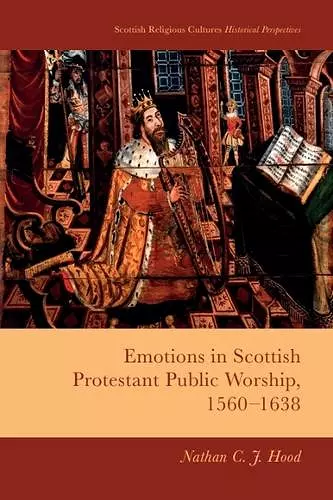Emotions in Scottish Protestant Public Worship, 1560-1638
Format:Hardback
Publisher:Edinburgh University Press
Published:31st Oct '25
Should be back in stock very soon

This book explores the affective dimension of Scottish Protestant public worship in early modern Scotland. It examines how the intensely emotional character of Scottish Puritan or godly piety was reflective of the emotional norms many Scots had to navigate in congregational worship following the Protestant Reformation. Using historiographical approaches developed within the history of emotions discipline, the book argues that in corporate rituals such as prayer, preaching, public repentance, fasting and the Lord's Supper, Scottish Protestants were expected to experience and express a variety of feelings that were associated with the cycle of conversion. These prescribed emotions were seen as integral to the efficacy of the liturgy, playing a vital role in the individual's, community's and nation's encounter with God. The book argues that these standards of emotion were informed by medieval, secular and protestant sources and new perspectives emerge on their profound impact upon the major political events that shaped seventeenth century Scotland.
For all that Protestant Christianity is a religion of the book, with faith under the authority of the Word, it is arresting that weeping and sighing were the signs of corporate covenant renewal, notably at the signing of the National Covenant in 1638. This mode of expression could be shared by all, from the mightiest theologian to the barely educated. Fully informed by the work of ‘historians of the emotions’ and by the last decade or two of work on the piety of the ‘Scottish Reformations’, this work pinpoints contemporary (i.e. early modern) ‘research’ formed from the case-studies of the likes of Rev. John Weemes, but also insightful female writers (Mistress Rutherford, Elizabeth Melville). The Post-Reformation continued the embodied expressiveness of late medieval piety including public penance, and the significance of Romans 8:26-27, ‘even’ for the likes of John Knox, is made clear. The positivity of the preaching of David Dickson and Robert Rollock, to take two examples, is refreshing: grace can extend to every type of sinner. Preaching was about ‘use’ or application of Scripture, moving from worldly sorrow to godly sorrow and setting up for the corporate mystical experience of Reformed Communions. In showing how the affections moved by the Spirit as the link between instruction and Christian practice at the origins of the Scottish Protestant Kirk, Emotions in Scottish Protestant Public worship should be required reading for church leaders of public worship today. * Mark Elliott, University of the Highlands and Islands *
An invigorating journey in the history of emotions, looking at the powerful feelings cultivated by Protestant worship in early modern Scotland. Its findings negate the tired stereotype of dry impassive Calvinism and give a fresh perspective on the fervour that surrounded the Scottish National Covenant of 1638. -- Susan Hardman Moore, University of Edinburgh
Scottish Presbyterian worship still has a reputation for dry, forbidding austerity. Nathan Hood's methodologically astute book shows us just how wrong that stereotype is. If the emotions of public worship were tightly disciplined and carefully socially directed, that only meant that they surged more powerfully and carved deeper channels into the Scots soul. -- Alec Ryrie, Durham University
ISBN: 9781399507394
Dimensions: unknown
Weight: unknown
296 pages